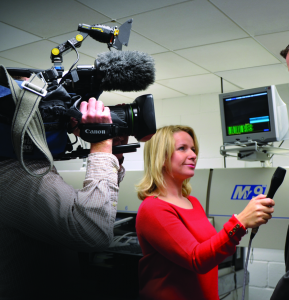 Engaging with the media can be tough, as noted by many of the academics who attended the PolicyBristol workshop. Some of the potential barriers they identified included:
Engaging with the media can be tough, as noted by many of the academics who attended the PolicyBristol workshop. Some of the potential barriers they identified included:
– Requirement for research findings to be ‘timely’
– Mismatch of pace
– The feeling of needing to be an expert
– Distraction from ‘day job’
– Fear of misrepresentation
But behind these potential challenges, there’s a whole host of benefits. Getting your research into the public domain is often essential for realising its impact, and can also be an important source of participants/collaborators for your research itself. One could also argue that, from a moral or ethical perspective, change should involve public opinion. As Sue Littlemore, former BBC Education Correspondent, pointed out: it’s not about engaging with the media for its own sake – it’s about ‘communicating with the world’.
Paul Howard-Jones, Reader in Neuroscience and Education, has had considerable experience of working with the media. He has published interviews in the Times Educational Supplement, appeared on several Radio 4 programmes including ‘The Educators’ (where he was interviewed by Sarah Montague), as well as appearing in a number of TV programmes for teachers and a recent Channel 4 documentary, ‘The Secret Life of 4 Year Olds’.
He has certainly reaped the rewards, but he has also learnt a few lessons the hard way! Paul shared some valuable ‘top tips’ with us:
10 ‘top tips’ for media engagement
- Play for time: if a journalist phones you, ask them to call back in a couple of hours. Yes, they need a timely response, but there’s usually a bit of leeway.
- Preparation, preparation, preparation! Find out what the questions are going to be, or at least what angle the interview will take; know your ‘take home’ messages. And don’t be shy about saying ‘that’s not my field of expertise’.
- There’s often not much difference between a ‘live’ interview and an interview that’s conducted ‘as if live’ – find out in advance whether there will be any re-takes/editing.
- Don’t be too open… Journalists will sometimes try the personal tack – decide in advance what your boundaries are. Never talk about other colleagues (or their work), even anonymously.
- Take control! Consider recording any telephone conversations with journalists (with prior approval) and hold them to account: check the BBC editorial guidelines BBC editorial guidelines.
- Start preparing a press release 3 weeks ahead of publication date e.g. for a journal article.
- Keep the Press Office in the loop; they can help field any follow-up calls after the press release/interview.
- Consider writing a blog to coincide with the interview/press release – it could be posted on your School blog, on the PolicyBristol Hub, or even on The Conversation (PolicyBristol can help you both in drafting and disseminating blogs).
- Pre-empt any ethical implications: consider getting participants to sign a consent form at the outset, giving you permission to use quotes/photographs etc. further down the line.
- Remember to inform your funders.
Sources of support
If you’re a University of Bristol academic and you’re keen to reach the widest possible audience for your research, here are a few pointers to people who can help you:
- Science Media Centre (SMC) – serving as ‘an independent press office’ ensuring that the public have access to the best scientific evidence and expertise through the news media when science hits the headlines.SMC includes social science; for education researchers, see also the Education Media Centre.
- University of Bristol Press Office – drafting press releases, advising on timing for media ‘hooks’, liaising with journalists on your behalf, etc.
- PolicyBristol – helping you raise the profile of your policy-relevant research, including help with drafting and targeting policy briefings, horizon scanning so that you know what’s coming up on the policy agenda, and much more!
This workshop aimed to raise some of the issues, share experience and expertise from both sides, and signpost support. The Press Office run workshops on some of the more practical skill (see the Staff Development webpages). If you have ideas for future training events, we’d love to hear from you: policy-bris@bristol.ac.uk
In the meantime, good luck and remember: you’re the expert!
